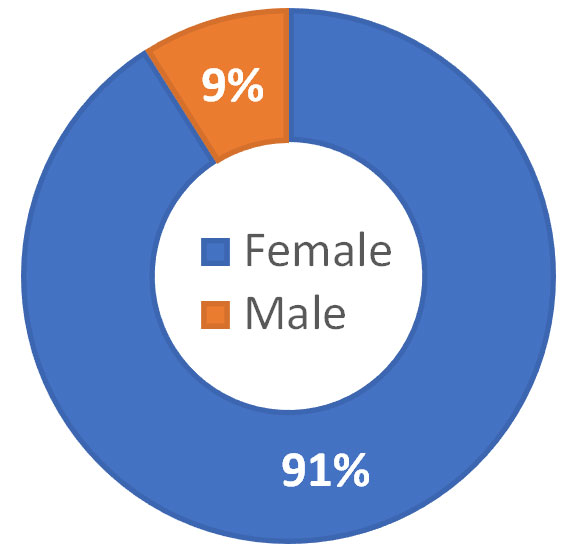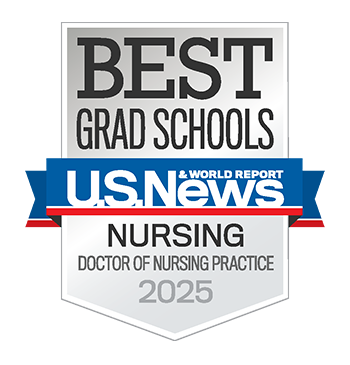Doctor of Nursing Practice (DNP) Advanced Practice
Need your questions answered?
OVERVIEW
Why Hopkins?
Unlock the unlimited potential of an advanced nursing career at the Johns Hopkins School of Nursing. You can build close relationships with our world-renowned faculty who have broad experience in advanced clinical practice, leadership, and patient safety, and network with other emerging nurse leaders in your cohort. You’ll graduate ready to change the health care system and advance the nursing profession.
DNP prepared nurses are equipped with the knowledge, skills, and respect to drive health care innovation and enhance the quality of care. Johns Hopkins prepares graduates to exercise advanced levels of clinical judgment and systems thinking. Many DNP graduates have expanded responsibility and accountability in planning, implementing, and evaluating evidence-based strategies to improve individual patient and population health outcomes.
Our DNP Advanced Practice tracks:
DNP NP tracks offer online coursework with the added benefit of course immersions designed for students to take advantage of the rich and varied learning opportunities found only at Johns Hopkins. The Nurse Anesthesia track provides real-world conditions using state-of-the-art simulation technology, and train in interprofessional teams with the Johns Hopkins School of Medicine. Whatever your path, you will have support every step of the way, including dedicated faculty and staff to assist with project development and provide graduate-level academic support.
Program Details
Tuition & Fees
Estimated Tuition Cost: $2,057 per credit
See Details
Financial Aid: There are numerous options for financing your education including grants, scholarships, federal loans, and employment programs. Learn more.
Upcoming Application Deadlines
Fall entry: Nov 1 and Jan 15
(Nurse Practitioner Tracks)
Summer entry: September 1
(Nurse Anesthesia Track)
Requirements
Admission Criteria
Please visit individual DNP Advance Practice track pages for specific requirements for each track.
Bachelor of Science in Nursing Degree or an entry-level nursing master’s degree from an ACEN or CCNE accredited college or university or an equivalent degree from a comparable foreign institution
Scholastic GPA of at least 3.0 on a 4.0 scale
Applicants must submit evidence of current nursing license. Online students must have or obtain RN license from an authorized state. (some tracks have more specific requirements)
One year of full-time RN experience preferred
Three letters of recommendation (both academic and professional references; check FAQs for detailed guidance on completing this requirement)
Official Transcripts (from all previous colleges/universities)
Current Resume /CV (check FAQs for detailed guidance on completing this requirement)
Goal statement
GRE scores are accepted but not required
Interview with faculty (if moved forward by admissions committee)
Prerequisites
Undergraduate Statistics* Take at Hopkins Nursing. Course must be completed at a regionally accredited college or university with a letter grade of B or better. Grade of B- will not be accepted.
Students are required to maintain current licensure throughout the program. Additional RN licenses in surrounding states may be necessary to secure a clinical rotation. Where applicable, a current unencumbered compact (multistate) license will substitute for a single state license. Nursing licensure costs are the responsibility of the student.
*Topics should include correlation and linear regression; experimental design such as t-tests, analysis of variance and chi-square; suggested departments: psychology, sociology, education, biology, and mathematics. Statistics courses offered by business, management, and economics departments are typically more theory-based and lack the experimental design component.
State-Specific Information for Online Programs
Please see individual track web pages for state restrictions. For more information, please contact an admissions representative. Students should be aware of additional state-specific information for online programs. Students are required to maintain current licensure throughout the program. Additional RN licenses in surrounding states may be necessary to secure a clinical rotation. Where applicable, a current unencumbered compact (multistate) license will substitute for a single state license. Nursing licensure costs are the responsibility of the student.
Student Sponsorship
This program does not qualify for F-1 or J-1 student sponsorship. Legal Permanent Residents and non-immigrants who are otherwise physically present in the U.S. and in a status that allows for full or part-time study, may pursue this program.
DNP Advanced Practice profile based on Fall 23 cohort
* The profile encompasses all DNP NP tracks.
32%
Underrepresented Minority

91% Female/9% Male
29%
First Generation
16
Countries Represented
32
States Represented
30
Average Age
3
Average Years Nursing Experience
Curriculum
Doctor of Nursing Practice (DNP) Advanced Practice Track
Transfer Credits from the JHSON MSN (Entry into Nursing) Program to the DNP Advanced Practice Track can vary based on current curriculum & start date.
Course Immersion Dates
- SUMMER 2025 DNP AP Immersion Schedule
- FALL 2025 DNP AP Immersion Dates
- SPRING 2026 DNP AP Immersion Dates
- SUMMER 2026 DNP AP Immersion Dates
* Dates do not include remediation dates
DNP Advance Practice Tracks
Nurses who want to improve outcomes for acutely and critically ill adult patients will experience a vigorous academic setting and benefit from rich and varied clinical opportunities to manage adult patients across the continuum of acute, chronic, and critical care. With access to unparalleled Hopkins resources, clinical sites, and faculty, you will learn to develop and apply your assessment, diagnostic, and treatment skills for fast-paced environments where patients are physiologically unstable, technologically dependent, and highly vulnerable to complications.
Learn more about the curriculum
This track prepares the student to provide person-centered evidenced based primary care to young adults (including late adolescents and emancipated minors), adults, and older adults (including young-old, old, and old-old adults). Emphasis is placed on the primary care management of acute episodic and chronic conditions and integration of health promotion and disease prevention throughout the adult lifespan.
Learn more about the curriculum
Prepare to provide complete, advanced care for the whole family in this option that couples theoretical background with evidence-based clinical experiences in a wide variety of community-based practice settings.
Learn more about the curriculum
The Pediatric Primary Care Nurse Practitioner Track at the Johns Hopkins University School of Nursing prepares nurses for advanced practice as a primary care provider who helps children and their families to achieve their optimal physical, social, and emotional development. At Hopkins, faculty have designed a curriculum that combines diagnostic and pharmacological background with hands-on experience in various healthcare settings.
Learn more about the curriculum
Expand your nursing expertise in adult or child health with the Johns Hopkins Clinical Nurse Specialist doctoral program. You’ll build competencies in clinical theory and research-based nursing practice, and you’ll put your new skills to use delivering direct patient care, organizing resources while controlling costs, and educating nurses to improve healthcare delivery systems.
Track Options
Adult Health Clinical Nurse Specialist
Adult Critical Care Clinical Nurse Specialist
Pediatric Critical Care Clinical Nurse Specialist
In the DNP Advanced Practice Track: Pediatric Dual Primary/Acute Care Nurse Practitioner program, students will earn their DNP and be eligible to apply for certification as a primary care pediatric nurse practitioner and as an acute care pediatric nurse practitioner.
Learn more about the curriculum
One in five American adults live with a mental, behavioral or emotional disorder, with even more gaps in access to care laid bare by the COVID-19 pandemic. Become a psychiatric mental health nurse practitioner (PMHNP) in Johns Hopkins School of Nursing’s top-ranked DNP Advanced Practice track and help meet the deep demand for mental health services.
Learn more about the curriculum
Become a nurse anesthetist, consistently ranked one of U.S. News & World Report’s top 10 best jobs since 2016. The DNP Advanced Practice Nurse Anesthesia track prepares students to administer anesthesia and anesthesia-related services independently and as a team member through a curriculum that emphasizes evidence-based practice, leadership skills and systems-level thinking. Graduates become sought-after members of anesthesia departments and professional organizations; they are prepared to respond to the changing technology and health care policy landscape, and manage anesthesia needs across our aging and diverse population. Students will become associate members of the American Association of Nurse Anesthetists (AANA).
Learn more about the curriculum
“Johns Hopkins is strategically situated in the inner city of Baltimore. There are many disparities that minorities face within the community; I wanted to situate myself in a place where I could be most effective.” Morgan Dupree
Morgan Dupree
Engage with Us
Join us soon for a tour, on-campus event or a virtual visit.
Request Information
Speak with Admissions to learn more about our programs.
Virtual Info Sessions
See recordings of some of our recent virtual info sessons.
Tuition & Other Costs
Financial aid
Scholarships & Grants: Grants are awards based on financial need that do not have to be repaid. Many students also benefit from scholarships and awards based on merit. Learn more.
Loans: Many students will avail themselves of loans to help finance their School of Nursing education. If necessary, we encourage you to borrow only what is absolutely essential to cover your educational costs. Learn more.
Employment: Many students locate part-time employment to help pay education expenses. Numerous positions are available on campus and within various community based organizations. These jobs provide students with opportunities to gain practical work experience. Most positions are funded through the Federal Work-Study Program. Learn more.
Frequently Asked Questions
The DNP is a doctoral degree focused on the clinical practice of nursing. The degree represents the highest academic preparation for nursing practice. The DNP Advance Practice curriculum focuses on the knowledge needed to provide comprehensive direct care across settings. It can be conferred in conjunction with any specialty in advanced practice.
A strong foundation in courses such as anatomy and physiology, microbiology, pharmacology, and physical assessment with a grade of B or above is one key to success.
The curricular content will enable the graduate to make complex diagnoses, provide evidence-based treatment modalities, utilize sophisticated informatics and decision-making technology, and assimilate in-depth knowledge of biophysical, psychosocial, behavioral and clinical sciences.
The expanded competencies of the DNP Advanced Practice Track enable graduates to independently provide complex care across all settings including ambulatory, acute, community and home settings. For example, the expanded curriculum will focus on the utilization of evidence-based decision-making to admit and co-manage hospitalized patients, to provide advice and treatment initiated over the phone, and to initiate specialist referrals and evaluate the subsequent advice and initiate and participate in co-management.
There are three and four year plan options. A part time plan of study is not available.
The DNP Advanced Practice Track is completed over a 3- or 4-year period. Students who are enrolled in the 4-year plan may be able to work in the first year as a Registered Nurse in settings that offer flexible scheduling. As students begin to take specialized courses that prepare them for the respective role (i.e., NP or CNS), they will be engaged in settings to learn their future role and in which the DNP Project is situated. Hence, it will be challenging to maintain employment that is not flexible beyond the first year.
The DNP, or clinical doctorate, prepares the graduate to practice independently with the most complex patients, in any setting where the patient requires care, utilizing complicated informatics and evidence-based decision-making. Research doctorates prepare graduates to initiate and conduct sophisticated research projects, serving as the principal investigator.
The school accepts up to six credits of transfer from outside the Johns Hopkins University School of Nursing. Please refer to the Academic Catalogue for the list of transferable courses. Once admitted into the program you can request to transfer credits by completing the transfer of graduate credit form.
The School of Nursing follows the regular academic schedule (prospective students should note that these courses are not self-paced). Students are enrolled for the fall, spring, and summer terms. Prospective students should refer to the plans of study found on the curriculum pages for each specialty.
Please visit School of Nursing’s Tuition and Fees page for the current program costs.
JHSON uses a blended format, offering courses onsite and online.
The DNP program requires a minimum of 1000 practice hours. The majority of these hours will be in the clinical practicum where you will apply what you learn in the theory courses to gain the competence required for your particular specialty. The balance of the practice hours are devoted to the DNP practicum which focuses on the DNP Scholarly Project. Ideally, you will have one-year of RN experience before starting the first specialty clinical.
Many of the core courses will be taken by all DNP Advanced Practice students at the same time. This could be as many as 60 students. However, the track specialty courses will be taken with only students in that specific specialty. In clinical courses, there is a ratio of 1 to 6 students per clinical instructor with each student assigned to a preceptor.
Students in the same specialty and the same plan of study (3- or 4-year) will move through as a cohort.
It is possible for students to negotiate a clinical site within their area of interest, but these cannot be guaranteed. The DNP Scholarly Project could allow students to identify a problem within a specific area and bring that together with the specialty role.
Clinical practicum experiences are determined by the student’s area of focus, student interest/experience, site and preceptor availability, and the student’s programmatic needs. The student works collaboratively with the Track Director and the Clinical Placement Team to request sites and identify preceptors, with final approval by the Track Director. Following an orientation to the electronic software system, the student will be responsible to complete clinical requests and upload required school and site compliance documentation by the due date. The due date is prior to the semester that includes a clinical course. Students will be working with the Clinical Placement Team throughout the course of their program. The Clinical Placement Team participates in orientation, advising sessions, and on-site immersions. The student is encouraged to work collaboratively and proactively with the Clinical Placement Team. An all-hands on approach yields optimal preceptor opportunities. Unauthorized states for clinicals include LA and NY. Admitted students who decide to enroll will be required to sign the “Student Expectations in the Clinical Placements Process” document prior to their first term in the program. For more information on Clinical Placement Services, visit https://nursing.jhu.edu/clinical-placement/.
The American Association of Colleges of Nursing requires that all DNP Projects should:
Focus on a change that impacts healthcare outcomes either through direct or indirect care.
Have a systems (micro-, meso-, or macro- level) or population/aggregate focus.
Demonstrate implementation in the appropriate arena or area of practice.
Include a plan for sustainability (e.g. financial, systems or political realities, not only theoretical abstractions).
Include an evaluation of processes and/or outcomes (formative or summative). DNP Projects should be designed so that processes and/or outcomes will be evaluated to guide practice and policy. Clinical significance is as important in guiding practice as statistical significance is in evaluating research.
Provide a foundation for future practice scholarship.
There are four DNP Project courses that sequentially reflect the stages of evidence based practice quality improvement: Project Identification, Project Proposal, Project Implementation, and Project Evaluation. Each of the four courses has an associated practicum. The first course for the DNP Project, DNP Problem Identification has an accompanying DNP practicum. The DNP Project is situated in the clinical setting where the student will carry it out. As the project is a quality improvement focus, key stakeholders in the practice setting are necessary to identify clinical problems they want to address and for which they want to partner with a student or team of students. See your plan of study for the number of practicum hours associated with each course associated with the DNP Project.
At least one letter should come from a recent or current direct supervisor/manager (the person who is responsible for your performance evaluation)
At least one letter should come from an academic faculty member who can speak to your ability to successfully complete a demanding graduate level academic and clinical program.
The third letter can come from a second academic faculty member or an individual in a leadership position who can speak to your clinical abilities.
Personal references from colleagues, friends, or family members do not meet the requirement.
If you are unable to provide one of the reference letters above, please upload a statement of explanation to your application.
Please include the following information in your resume or CV:
Work experience (include dates, sites and locations; paid and unpaid; any residency participation)
Education Background
Scholarly activities (research, presentations, publications, honors, awards)
Professional activities (leadership, certifications, professional organization membership, service on committees)
Community Service/Volunteerism
